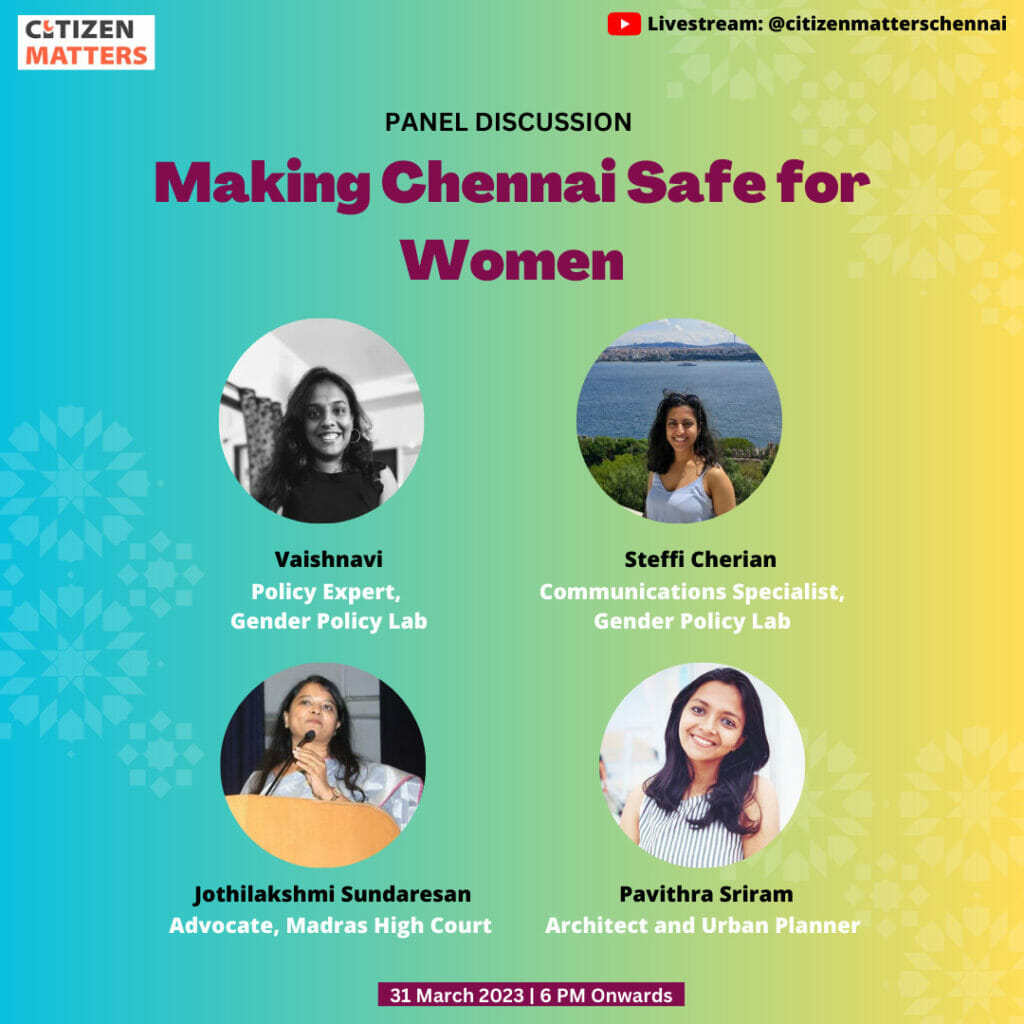A recent study found Chennai to be the top city for women in India. Chennai ranked first among metro cities with a million-plus population. The parameters that the ranking was based on included safety and ease of living for women.
At the same time, crimes against women in Tamil Nadu have seen an increase by 40% in 2022 according to data from the National Crime Records Bureau.
So, how easy is it to navigate life in Chennai as a woman? Is the city as safe and convenient as perception seems to suggest? What does freedom mean for the women of Chennai?
Read more: Tips for women in Chennai to fight the stalking menace
Taking up space as a woman in Chennai
Citizen Matters Chennai brings together a panel to look at the safety of women in Chennai city and their ability to exercise their right to the city’s public spaces.
The panel will address broad issues faced by women in accessing public spaces, public transport and ease of navigating the city. We will also be considering aspects of legal remedies available to women who have experienced harassment or been put in unsafe situations in public.
The panel will also look at steps being taken to address safety and accessibility through the efforts of the Gender and Policy Lab of the civic body and consider how planning for the future of Chennai can take on a feminist lens.
The webinar will be held over zoom and live-streamed on our YouTube channel.
A summary of the discussion will be shared on the website, and the recording will be available on YouTube.
Date: March 31, Friday
Time: 6 pm – 7 pm
Read more: Will GCC’s Gender Lab project make Chennai safer for women and trans persons?
Our speakers
Vaishnavi, Policy Expert, Gender and Policy Lab, GCC
Vaishnavi works as the Policy Expert with the Gender and Policy Lab. She has 8 years of experience in the social sector and has worked in local governance initiatives, livelihoods and education. Previously, she had her initiative in Kumbakonam working with the local community on gender, local democracy and climate action.
Steffi Cherian, Communications Specialist, Gender and Policy Lab, GCC
Steffi is the Communications Specialist with the Gender and Policy Lab in Chennai. She is a development sector practitioner with more than 6 years of work experience in programme development and implementation. Her sectoral experience includes gender and skilling, parliamentary research and urban livelihoods.
Jothilakshmi Sundaresan, Advocate, Madras High Court
Jothilakshmi is an Advocate practising in Madras High Court and other Subordinate Courts in Chennai since 2008. Her specialized area of practice is Property and Family Law. She is a Legal Aid Panel Advocate in Madras High Court, Justice & Hope and other NGOs. She is passionate about women’s rights.
Pavithra Sriram, Co-founder of Design Co: Lab
Pavithra is the Co-founder of Design Co: Lab, an Architect, an Urban Planner and a Designer based in Chennai. As a strong advocate for safe and inclusive cities, since 2012, she has focused her career on placemaking, tactical urbanism, street designs, zero road fatality futures, urban ecology and city planning projects. She also authors Being Pedestrian, a blog on narratives of the city from the perspective of a pedestrian.
Pritika Meenakshisundaram, Director, FICUS
Pritika is the Director of the Foundation for Intersectional Climate and Urban Sciences (FICUS) and a regular user of public transport in Chennai.
